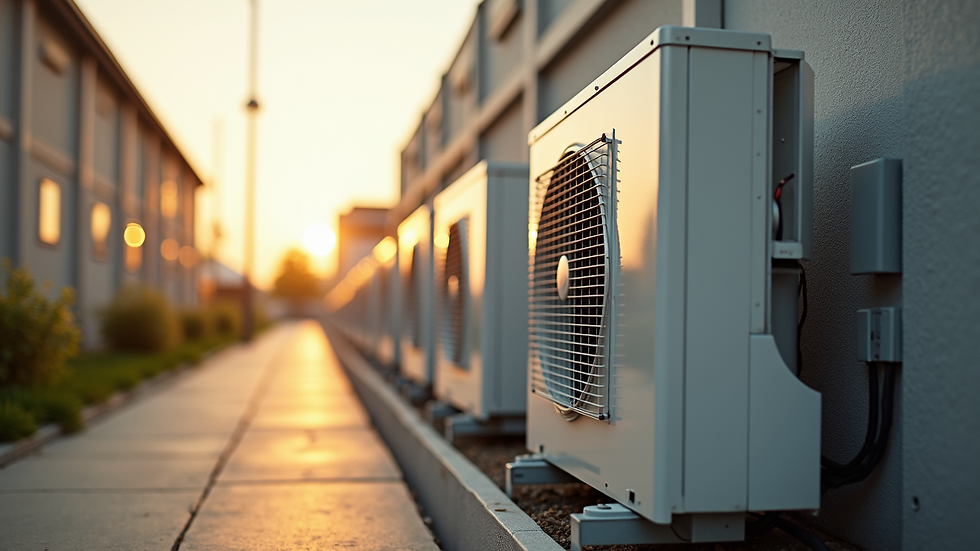Essential Air Conditioner Maintenance Tips for Canadian Homeowners to Stay Cool This Summer
- Aaron

- Jun 6, 2025
- 4 min read
As summer heats up, no Canadian homeowner wants to deal with a malfunctioning air conditioner. Proper maintenance is key to ensuring your unit runs smoothly, delivering the relief you need during scorching days. Whether you rely on central air or a window unit, essential upkeep can enhance performance and prolong the life of your system. Here are some vital maintenance tips to help you prepare for the summer heat.
Understand Your Air Conditioner
First, it's crucial to know which type of air conditioning system you own: central air or window air conditioning.
Central air systems cool larger spaces through ductwork, making them ideal for big homes. In contrast, window units serve single rooms or smaller areas, providing targeted cooling. Understanding your system enables you to tailor your maintenance efforts more effectively.
Clean or Replace the Air Filters
One of the most impactful maintenance tasks is ensuring your air filters are clean or replaced regularly. Dirty filters can restrict airflow, decreasing efficiency and potentially leading to costly repairs.
How Often Should You Check Filters?
Experience shows that homeowners should check filters monthly, especially during peak summer usage. If they appear dirty, replace them. A clean filter not only promotes better airflow but can also improve indoor air quality. In fact, clean filters can enhance efficiency by up to 15%, which is significant when you consider rising energy costs.

Clear the Surrounding Area
If your central air conditioning unit is outside, ensure that it is clear from obstacles like shrubs, branches, and debris.
The Importance of Airflow
Airflow around the outdoor unit is vital for efficient operation. Aim for at least two feet of clearance on all sides. Removing obstructions not only maintains efficiency but can also extend your unit's lifespan by up to 20%.
Inspect and Clean the Coils
Your air conditioning's evaporator and condenser coils are essential for heat absorption and release, respectively. Over time, dirt can accumulate, hindering their performance.
How to Clean the Coils
Use a soft brush or a vacuum with a brush attachment to gently clean your coils. Be careful, as they are delicate. If they appear excessively dirty or damaged, it may be best to call a professional. Regularly cleaning coils can boost efficiency by as much as 30%.

Check the Refrigerant Levels
Refrigerant is crucial for your air conditioning system, absorbing heat and providing cold air. Low levels can greatly reduce efficiency and unexpectedly drive up your energy bills.
Signs of Low Refrigerant
If you notice warm air blowing from your vents or a lack of cooling, your refrigerant levels might be low. This issue requires a certified technician for proper handling, as refrigerants can be hazardous if not managed correctly.
Inspect Ductwork for Leaks
Homeowners with central air need to check for leaks in their ductwork. Leaky ducts can lead to significant energy loss.
How to Check for Leaks
Look for accessible sections of ductwork and listen for any hissing sounds, which indicate escaping air. If leaks are suspected, temporarily patching them with duct tape is an option. However, consulting a professional for repairs remains the best route to ensure efficiency.
Schedule Annual Professional Maintenance
While DIY tasks are essential, an annual visit from a professional technician can be invaluable. They conduct thorough inspections and service checks, identifying potential issues before they escalate.
Monitor Energy Bills
Guarding against high energy bills during the summer is critical. A significant spike can indicate underlying problems with your air conditioning system.
How to Address High Energy Bills
If your energy bills surge unexpectedly, consider a DIY inspection or reach out to a professional. Inefficient performance might stem from dirty filters or leaks that need immediate attention.
Utilize Programmable Thermostats
Installing a programmable thermostat is an effective way to boost energy efficiency. These devices allow customized temperature settings, so you save energy while you're not at home.
Benefits of Programmable Thermostats
With a programmable thermostat, you can optimize your cooling based on your schedule. This not only saves energy costs but can also extend your air conditioning unit's lifespan by minimizing unnecessary wear.

Ensure Proper Attic Insulation
Poor insulation in the attic can cause heat to accumulate indoors, forcing your air conditioner to overwork.
Checking Insulation Levels
Inspect the insulation in your attic for quality and thickness. Properly insulating this area helps maintain comfortable indoor temperatures and eases your air conditioner's workload, potentially reducing energy costs by 10%.
Close Blinds and Curtains
During the hottest hours, closing blinds and curtains can significantly keep your home cooler without straining your air conditioning system.
Why Does This Work?
Blocking direct sunlight reduces indoor heat gain. This allows your air conditioner to operate more efficiently. Investing in blackout curtains or reflective window shades can amplify this effect.
Stay Mindful of Humidity Levels
Humidity levels can greatly influence how cool you feel indoors. High humidity can make the heat feel unbearable.
How Dehumidifiers Can Help
Pairing a dehumidifier with your air conditioner can enhance comfort during peak summer. This combination reduces the load on your AC system, improving overall efficiency. In fact, lowering humidity can help your system run 15% more efficiently.
Know When to Replace Your Air Conditioner
Despite regular maintenance, some air conditioning units eventually require replacement. Older systems not only work less efficiently but can also pose safety risks.
Signs It's Time to Replace
If your air conditioning unit is over 10-15 years old, frequently requires repairs, or cannot cool your home effectively, it may be time for a replacement. Investing in a new energy-efficient model could save you 20-40% on energy bills and provide reliable comfort during the hottest months.
The Bottom Line
Maintaining your air conditioning unit is crucial for Canadian homeowners who want to stay cool this summer. By following these maintenance tips, you'll enhance your system’s efficiency, save on energy bills, and extend its lifespan. Whether cleaning filters, inspecting coils, or scheduling professional help, every step you take helps create a comfortable living environment during those sweltering days ahead.
With these tips, you can confidently embrace the summer, knowing your well-maintained air conditioner is ready to provide you with the cooling comfort you need.




Comments